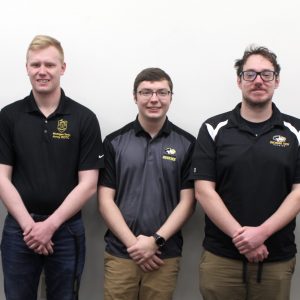
A team of five Michigan Tech students received Honorable Mention honors in the second annual SICK Inc. TiM$10K Challenge, a national innovation and design competition. University students from around the country participated in the event designed to support innovation and student achievement in automation and technology.
The Michigan Tech team members — Brian Parvin (ME), Paul Allen (EE), David Brushaber (CompEng), Kurtis Alessi (CompEng) and Alex Kirchner (CompEng) — earned Honorable Mention (fourth place overall) for their project, “Evaluating Road Markings (the Road Stripe Evaluator). Their project was sponsored by SICK Inc. Watch a video about the project below.
Adrienne Minerick, dean of Michigan Tech’s College of Computing, said in a June 1, 20920, Tech Today article that the accomplishments of these outstanding students illustrates Michigan Tech’s creativity and tenacity when faced with a challenge. “Our rapidly growing presence in cybersecurity is built upon our students deep knowledge of the fundamentals combined with the learning environment that promotes agility to meet (and exceed) any challenge. These hardworking and bright students deserve this recognition of their competitiveness. All of us in the College of Computing are proud.”
For the competition, teams were supplied with a 270-degree SICK LiDAR sensor and accessories, and challenged to solve a problem, create a solution, or bring a new application to any industry that utilizes the SICK LiDAR.
Each team submitted a video and paper for judging upon completion of its project. A panel of judges decided the winning submissions based on creativity and innovation, ability to solve a customer problem, commercial potential, entrepreneurship of the team, and reporting.
The Tech team developed an innovative product to help resolve issues caused by poor road markings, while reducing maintenance costs and improving motorist safety. Their new software uses reflectivity values obtained using a SICK LiDAR unit to identify deterioration of road stripes and recommend timely repainting, also aiding in the safety and reliability of self-driving vehicles on roadways.
They constructed a prototype to demonstrate functionality, in the form of a pushable cart that evaluates road markings. An intuitive user interface displays the markings being evaluated, and indicates if they meet necessary levels of reflectivity.
Pinar said the team was well organized and demonstrated an excellent work ethic from day one. “It was exciting to watch them identify a salient problem and develop a functional proof-of-concept solution despite the setbacks that affected us all after spring break,” he said.
“This was a unique project in that the team was required to identify a problem and develop a solution to it that is based on SICK’s TiM LiDAR, while most teams are handed a problem and asked to create a solution,” Pinar noted. “I think this format allowed the team to exercise even more innovation than on a ‘typical’ project.”
The same team of students was awarded Honorable Mention honors at this spring’s Design Expo Senior Design competition for their project, “Road Marking Reflectivity Evaluator.”

SICK, Inc. is one of the world’s leading manufacturers of sensors, safety systems, machine vision, encoders and automatic identification products for industrial applications.
